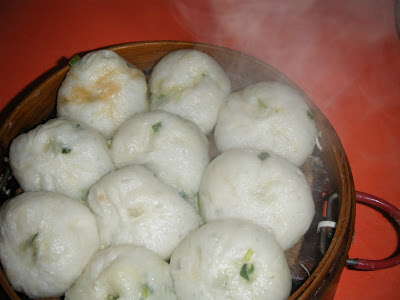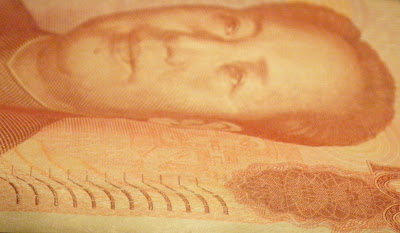"Eggplants are vehicles for flavor."
Over the years, I've drawn on these wise words of my good friend, Evan, many a time while in the kitchen.
While other vegetables are also vehicles for flavor -mushrooms, zucchini, and tofu- the versatile eggplant is one of my familiar favorites:
 red sesame sauces the eggplant
red sesame sauces the eggplant
First, a brief overview on how I classify eggplants into the following two types: prime and over-ripe.
If
preparing the eggplant is an intimidation, what of purchasing and knowing when an eggplant is ripe?
eggplant do'sThe 'prime' eggplant will have shiny skin and a body that is firm to the grip.
The skin color should be a deep forest indigo, with nary an undesirable brown patch. Whiteness at the stalk or base indicates a young, 'prime' eggplant.
The inner flesh should be white and a solid sponge-like mass. The seeds will not yet be visible. The flesh may still be slightly green near the skin, but this is not a problem.
A 'prime' eggplant -in my kitchen- is actually a bit under-ripe, green at the ends - just as I like my bananas!
eggplant don'tsThe skin of an 'over-ripened' eggplant will be soft and showing signs of wrinklage. If a gentle squeeze leaves an impression, do not buy! Of course, if the eggplant is already in your house, there are ways of reviving it (see below).
The resulting inner flesh will be limp and beginning to show brown variegated lines; the seeds are visible and maturing, creating a texture sensation that brings a wrinkle to the nose.
water goodA tip on maintaining freshness: eggplants like water.
If the eggplant starts to deflate with age, float it in a tub of water (before cutting it in anyway) and it will slowly [and mostly] rehydrate into its original shape and firmness. However, if the skin has already browned, I do not recommend this; it will take on water like a leaky boat!
Likewise, if
after cutting you soak it, a soggy sponge you will find. This is not recommended.
to skin or not to skin
As for eating, the naturally tough skin of a young eggplant turn off many, and thus they miss out on the wonderful flesh of the eggplant.
A cultural note that I have learned while living in the East: Northern Chinese tend to remove the skin. Southern Chinese leave the skin on. And both turn their nose up at the other's doing!
I usually spare the skin, for reasons of adding color, diversifying texture, and retaining vitamins. If I properly roast the eggplant wedges before adding any water to steam, I find that the skins acquire a paper-like texture, breaking down for greater palatability.
But for the staunchly eggplant wary, the skin can be easily removed, without any upset to most recipes.
the knife
One last tip on cutting: The Chinese cut oblong vegetables on a quarter turn (i.e., slice at an angle, turn 90º, slice at an angle, turn 90º, etc.)
This ensures that every chunk has some skin on it, while also ensuring that each chunk is mostly flesh.
It also serves a thermal application by allowing the wedges to cook up nicely around the thinner edges while staying a bit firmer at the center. the recipe: red sesame sauces the eggplant
I cooked up this particular dish, pictured above, in my kitchen last year, on the fly and with great results.
Unfortunately, I had not measured accurately, so I can only offer the below approximation:
ingredients
2-3 T vegetable oil
6-8 cloves garlic
1-in ginger, peeled
1 eggplant, large oblong
water, to steam
35-70 g tomato sauce
1 dollop sesame paste
1 T sugar
salt, to taste
spring onions, to garnish
method
Meanwhile, peel the garlic and ginger, and then smash them [individually] with the broadside of the knife blade.
Meanwhile, heat a generous amount of vegetable oil in a wok over medium flame.
A secret of mine is to drop a tiny clove of garlic in the oil right away; when it starts to sizzle, the oil is primed for adding vegetables. The fragrance serves as a nasal reminder and the sizzling offers an audible warning that the oil is cooking away, should I be minding the makings of another dish.
Mince, then sauté the smashed garlic and ginger over medium flame until golden.
Chop the eggplant into wedges, starting at one end and by turning 90º with each cut. Add directly to the garlic and ginger and oil, and continue tossing over medium heat:
 roast, roast, roast my... eggplant
roast, roast, roast my... eggplant
Roast the eggplant, adding a bit of oil to the bottom of the wok, so as to prevent burning. When the skins are sufficiently starting to paperfy, add water as necessary and cover with lid, to steam:
 almost good enough to eat right now
almost good enough to eat right now
Add the tomato sauce, sesame paste, sugar, and salt (to taste) at once to the center of the pot, stirring as it boils:
 caramelized goodness
caramelized goodness
Lastly, garnish with fresh or roasted sesame seeds and slivered spring onions: ready to serve and savor
ready to serve and savor
This dish keeps well, over the lowest flame, until the dinner bell rings -making it one of the few Chinese-style dishes that can suffer through a wait, if necessary.
Serve over a bed of fluffy white rice -or wheat noodles- and share with friends!As this dish above shows, the eggplant is one vegetable vehicle worth a culinary ride!
(Thank you, Daydra, for inspiring the content of this post with your question!)
Note: Access to Blogger is still blocked within China. Without access to a much-appreciated VPN (proxy), I would be unable to publish to my blog from within mainland China. Thus, I am blessed and grateful to be sharing. With every post, I hereby protest the oppressive nature of the Chinese government blocking access to any part of the web.












































